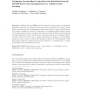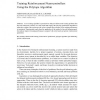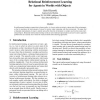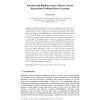155
click to vote
JMLR
2012
13 years 4 months ago
2012
Contextual bandit learning is a reinforcement learning problem where the learner repeatedly receives a set of features (context), takes an action and receives a reward based on th...
143
click to vote
AGI
2011
14 years 5 months ago
2011
We present an actor-critic scheme for reinforcement learning in complex domains. The main contribution is to show that planning and I/O dynamics can be separated such that an intra...
129
click to vote
CORR
2011
Springer
14 years 5 months ago
2011
Springer
In this paper, we confront the problem of applying reinforcement learning to agents that perceive the environment through many sensors and that can perform parallel actions using ...
101
click to vote
NECO
2010
15 years 15 days ago
2010
Reinforcement learning models generally assume that a stimulus is presented that allows a learner to unambiguously identify the state of nature, and the reward received is drawn f...
126
click to vote
JIRS
2010
15 years 16 days ago
2010
Distributed-air-jet MEMS-based systems have been proposed to manipulate small parts with high velocities and without any friction problems. The control of such distributed systems ...
128
click to vote
ICRA
2010
IEEE
15 years 18 days ago
2010
IEEE
Abstract— Reinforcement learning algorithms have been successfully applied in robotics to learn how to solve tasks based on reward signals obtained during task execution. These r...
149
click to vote
NN
2007
Springer
15 years 1 months ago
2007
Springer
Reinforcement learning is based on exploration of the environment and receiving reward that indicates which actions taken by the agent are good and which ones are bad. In many app...
111
click to vote
CORR
1998
Springer
15 years 1 months ago
1998
Springer
A new training algorithm is presented for delayed reinforcement learning problems that does not assume the existence of a critic model and employs the polytope optimization algorit...
132
click to vote
AAMAS
2002
Springer
15 years 1 months ago
2002
Springer
In reinforcement learning, an agent tries to learn a policy, i.e., how to select an action in a given state of the environment, so that it maximizes the total amount of reward it ...
159
click to vote
AIHC
2007
Springer
15 years 8 months ago
2007
Springer
Computer models can be used to investigate the role of emotion in learning. Here we present EARL, our framework for the systematic study of the relation between emotion, adaptation...





